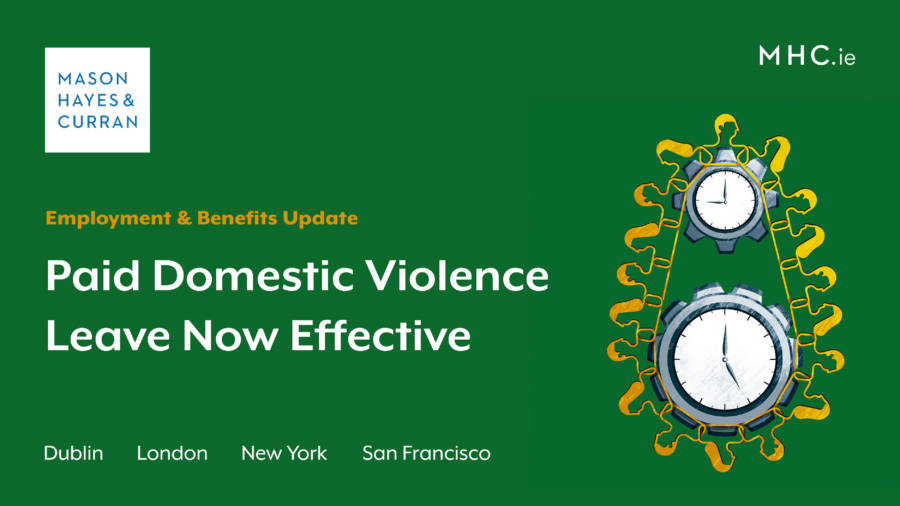Paid Domestic Violence Leave Now Effective

We recently saw the introduction of fully paid leave for employees who suffer, have suffered, or are at risk of suffering domestic abuse. Our Employment Law & Benefits team discusses what this leave entails and what employers need to consider going forward.
Ireland recently became one of the first EU countries to implement paid domestic violence leave for employees. Domestic violence leave was introduced by the Work Life Balance Miscellaneous Provisions Act 2023. Regulations providing for the commencement of this leave have now been published, and these rights came into force on 27 November 2023.
The Irish Government has worked in collaboration with Women’s Aid to provide guidance and sample policy documents to assist employers in implementing this leave.
Paid leave
The 2023 Act introduces a new section into the Parental Leave Acts 1998 to provide for domestic violence leave. Under this provision, employees who are experiencing or have experienced domestic violence are entitled to up to five days’ paid leave in a 12-month period. The purpose of this leave is to enable employees, or assist a relevant person, to:
- Seek medical advice
- Attend a victim services organisation
- Obtain counselling
- Seek advice from legal practitioners or the Gardaí, and
- Avail of a range of other services
Employees benefiting from this leave are entitled to full pay, despite earlier speculation that the leave would be capped at a certain financial limit. Women’s Aid emphasised the need for fully paid leave. It noted that perpetrators of domestic violence will often seek to exert financial control, and fully paid leave can help counteract this.
Other rights
These rights extend not only to employees who are victims of domestic violence, but also to employees assisting relevant persons to access or obtain supports. A relevant person is a spouse, dependent child, cohabitant, or another dependent person. In recognition of the fact that domestic violence occurs without warning, employees can avail of this leave retrospectively without advance notice. The legislation simply requires employees to notify their employer as soon as reasonably practicable, and no documentary evidence is required.
Other relevant rights within the legislation include:
- The protection against penalisation for employees who avail of domestic violence leave
- The protection of employment rights so that employees are not affected by the taking of domestic violence leave, and
- The lack of a minimum service requirement to avail of the leave
Employers are obliged to maintain a record of domestic violence leave taken by employees, noting the relevant employee’s period of employment and the dates on which they took leave.
Women’s Aid Guidance Note and Template Policy
In collaboration with Women’s Aid, the Government has published a Guidance Document and Template Policy for employers to assist in the implementation of domestic violence leave. While the creation of a domestic violence policy is not a legal requirement, it is recommended for a more visible and robust application of domestic violence leave.
The Guidance centres on three key principles for the safe and effective operation of domestic violence leave:
- Confidentiality
- An employee-led approach, and
- Leaning on existing practices and policies
The aim of the document is to assist employers in embedding this leave within wider organisational responses to domestic violence.
The Guidance Document makes a number of suggestions including:
- The appointment of a designated person for the application of the provisions of the 2023 Act
- Ensuring access to support is uncomplicated and confidential,
- Considering training and supports for the designated person, and
- Ensuring facilities to work on-site are always available for employees who typically work from home
The Government’s Template Policy is a useful document for employers to consider in implementing domestic violence leave in the workplace. It covers internal and external supports available to employees who are subjected to domestic violence, incorporating all of the provisions of the 2023 Act.
Conclusion
We encourage employers to now put in place a domestic violence policy to take account of the new leave rights. The Government’s Guidance Document and Template Policy serves as a helpful starting point. Of course, it is open to employers to offer more than the statutory requirement of five days’ paid leave, and many have already opted to do so.
Employers should also note that Women’s Aid has organised information sessions to support employers as they implement domestic violence leave between November 2023 and March 2024. Details can be found by visiting www.dvatwork.ie.
For more information and expert advice on ensuring your organisation is fully compliant, please contact a member of our Employment & Benefits team.
The content of this article is provided for information purposes only and does not constitute legal or other advice.
Share this:


